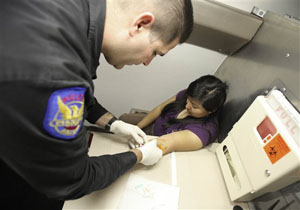 In July 2012, Mississippi passed a DUI child endangerment law which created a separate offense for driving under the influence with a passenger under the age of 16.
In July 2012, Mississippi passed a DUI child endangerment law which created a separate offense for driving under the influence with a passenger under the age of 16.
If the offense does not include serious injury or death to the child involved, and if it is the first conviction for DUI, then the driver will charged with a misdemeanor, be fined no more than $1,000 and can be imprisoned for up to twelve months.
A second conviction that does not result in serious death or injury to the child will also be a misdemeanor offense, and the fines will be at least $1,000 and no more than $5,000. The offender can also be jailed for up to one year.
A third or subsequent conviction not involving injury or death to the child is a felony, and fines go up to $10,000 and the offender can be imprisoned for up to 25 years.
A first offense with injury or death to the child can be charged as a felony, and fines could go up to $10,000 and the offender can face up to 25 years in prison.
Up until this year, Mississippi was one of the only states that did not have a DUI child endangerment law. In 2011, a child endangerment bill died in session when no motion was made to table the motion to reconsider, and a similar bill met the same fate in 2010.
In September, a driver with five children in the vehicle crashed, resulting in a rollover. He faced five counts of endangering a child by DUI.
 California drivers no longer have the option to choose which chemical test they may take when arrested for driving under the influence. The old law allowed a driver to decide whether they submit to a blood, breath, or urine test. Sometimes, the driver who submitted to a breath test would also be request to take either a urine or blood test, again one of their choosing.Revisions to this law prohibits the arrestee’s option of choosing a urine test, and instead requires that if a blood test is unavailable then they have automatically consented to giving a urine test. The new law states that a person only has the choice of a breath or blood test. If a person is unable to give a blood test and is exempted from doing so, then they must give a urine test.
California drivers no longer have the option to choose which chemical test they may take when arrested for driving under the influence. The old law allowed a driver to decide whether they submit to a blood, breath, or urine test. Sometimes, the driver who submitted to a breath test would also be request to take either a urine or blood test, again one of their choosing.Revisions to this law prohibits the arrestee’s option of choosing a urine test, and instead requires that if a blood test is unavailable then they have automatically consented to giving a urine test. The new law states that a person only has the choice of a breath or blood test. If a person is unable to give a blood test and is exempted from doing so, then they must give a urine test.
 Georgia has been overdue for DUI law reform, and in April the State Senate expanded SB 236, an Act which allows repeat DUI offenders to have more flexibility in their driving privileges.
Georgia has been overdue for DUI law reform, and in April the State Senate expanded SB 236, an Act which allows repeat DUI offenders to have more flexibility in their driving privileges.